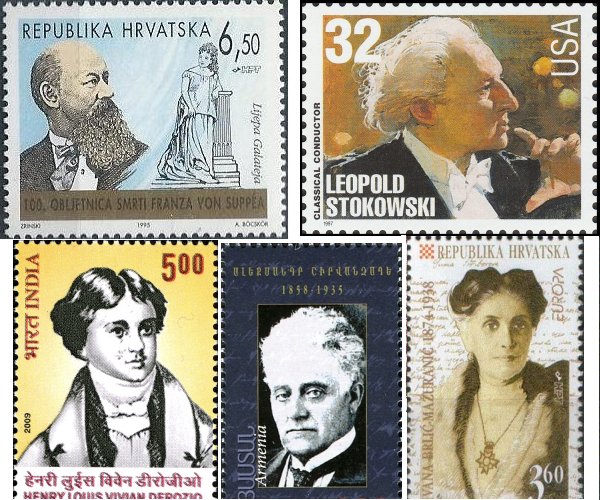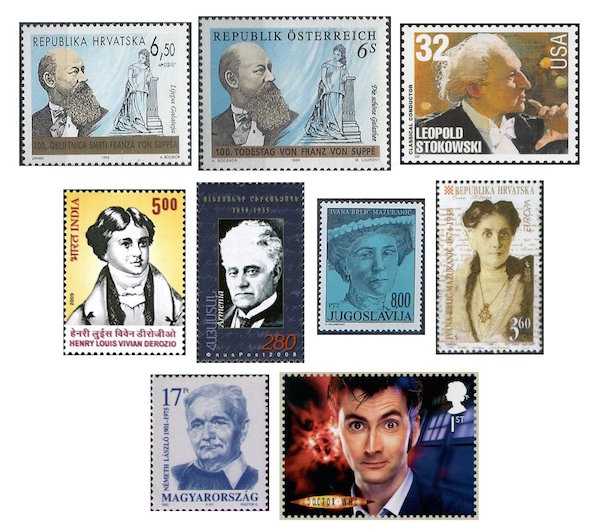The Arts on the Stamps of the World — April 18
An Arts Fuse regular feature: the arts on stamps of the world.

By Doug Briscoe
Our two headliners today are both from the classical music world. Otherwise our birthday subjects were all writers (and yet another Doctor Who).
The composer of the famous Light Cavalry Overture (not to mention the rest of that opera), Franz von Suppé, was born on this day in 1819 (died 21 May 1895). Suppé was born with the unmanageable monicker Francesco Ezechiele Ermenegildo Cavaliere di Suppé-Demelli and was distantly related to Donizetti. He is shown in an international dual issue, released on the same day by Croatia and Austria in 1995, the centenary of Suppé’s death. Dual issues like these are not at all uncommon, and the United States has collaborated in a number of them.
Also born today was conductor Leopold Stokowski (1882 – 13 September 1977), who in his early days was quite the matinée idol (an image he sedulously cultivated) and later conducted the soundtrack for Disney’s Fantasia. He made his first recordings in 1917 and his last sixty years later at the age of 95. He also made the very first American recordings of many scores from the central symphonic repertoire (Beethoven 7th and 9th, Dvořák’s New World, Tchaikovsky’s 4th, etc., etc.) The late Gunther Schuller told the present writer (I’ve always wanted to use that phrase!) that Stokowski was a combination of genius and charlatan.
Henry Louis Vivian Derozio (18 April 1809 – 26 December 1831) was less influential for his poetry, admired as it is, than for his teaching and as the stimulus for the Young Bengal movement that flourished after his early death. Indeed his followers came to be known as Derozians. Their aim was freedom of thought and the loosening of orthodoxy in various aspects of society, with effects felt most keenly in law and journalism. Derozio was born in Kolkata to a father of Portuguese descent and was already teaching at Hindu College when he was seventeen. He was expelled from his post for what you would expect: undermining the morality of the students. He died of cholera at 22.

The Armenian playwright and novelist with the pen name Alexander Shirvanzade (18 April 1858 – 7 August 1935) was born Alexander Movsesyan in a part of the Russian Empire that today is Azerbaijan. While working as a clerk in the budding oil industry, he read voraciously in Armenian, Azeri, and Russian literature along with contemporaneous French literary novels (Stendhal, Balzac, Flaubert, Zola) and Shakespeare. He first wrote in protest against the depredations of industrialization, particularly in the oil business, concerns he addressed not only in articles but also in fiction and drama, the culmination being his novel Chaos (1898). Later he turned his attention to women’s issues. He lived his final years in the Soviet Union.
Croatian writer Ivana Brlić-Mažuranić (18 April 1874 – 21 September 1938) is best known in the realm of children’s literature. She was born into a family of intellectuals; her grandfather was a poet and politician, her grandmother’s brother the important literary figure Dimitrios Dimitriou, her father a lawyer and historian. She wrote poetry and essays before striking the public fancy with The Marvelous Adventures and Misadventures of Hlapić the Apprentice (1913). Three years later she followed that up with Croatian Tales of Long Ago. Thought of as the Croatian Hans Christian Andersen, she was four times nominated for the Nobel Prize. Alas, plagued by depression, she committed suicide at the age of 64. Hlapić was made into an animated feature film called Lapitch the Little Shoemaker in 1997.
László Németh (18 April 1901 – 3 March 1975) was already a successful writer shortly after earning his degree in dentistry, his story “Mrs Horváth Died” having won a magazine prize that same year (1925). Only two years later he had to give up dentistry on account of his having contracted tuberculosis. He continued writing articles and produced his first novel, The Human Comedy, in 1929. In addition to his half dozen novels he wrote nearly two dozen plays and 15 volumes of essays and was a tireless translator, fluent in eleven languages! In 1951, he won the Attila József Prize for his translation of Anna Karenina.
Scottish actor David Tennant (born David John McDonald; 18 April 1971) is known for much more than being the Tenth Doctor Who (2005-10), but that’s the reason he’s on a stamp. His 2009 BBC Hamlet was much acclaimed.
There is no philatelic remembrance, but we bid farewell to the late Barbara Hale, Perry Mason’s Della Street, who would have turned 93 today had she not passed away earlier this year on January 26.
Just yesterday we lamented the fact that English playwright John Ford (1586 – 1639) has no stamp, and today is the birthday of his contemporary and fellow playwright Thomas Middleton (1580 – July 1627), ditto.
A graduate of the University of Massachusetts with a B.A. in English, Doug Briscoe worked in Boston classical music radio, at WCRB, WGBH, and WBUR, for about 25 years, beginning in 1977. He has the curious distinction of having succeeded Robert J. Lurtsema twice, first as host of WGBH’s weekday morning classical music program in 1993, then as host of the weekend program when Robert J.’s health failed in 2000. Doug also wrote liner notes for several of the late Gunther Schuller’s GM Recordings releases as well as program notes for the Boston Classical Orchestra. For the past few years he’s been posting a Facebook “blog” of classical music on stamps of the world, which has now been expanded to encompass all the arts for The Arts Fuse.
